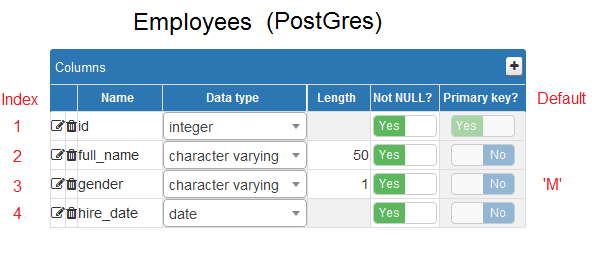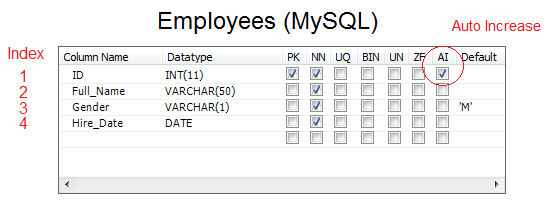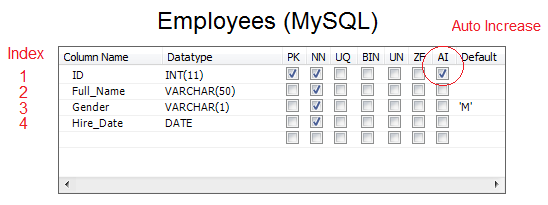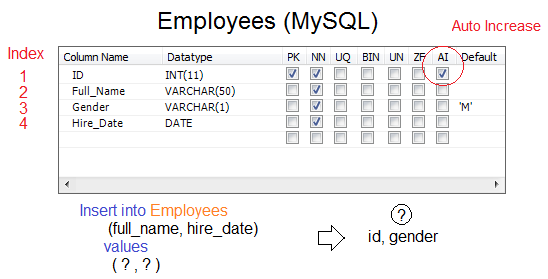Get the values of the columns automatically increment when Insert a record using JDBC
1. Problem
In some databases, the ID column of a table can be of type of which values automatically increase. Whenever you insert a record into a table, the value of this column is assigned by the database. You can not proactively assign a value to it. Your question in this case is how to obtain the ID of the inserted record.
In addition, some columns may not be invoilved in your Insert statement, in which case their values are assigned by default by a database. You want to get these values without creating a more query statement.
PostGres
In PostGres, the column with Serial type will have values automatically increasing by database.
** Employees (PostGres) **
CREATE TABLE Employees
(
ID serial NOT NULL,
Full_Name character varying(50) NOT NULL,
Gender character varying(1) default 'M' NOT NULL,
Hire_Date date NOT NULL,
PRIMARY KEY (ID)
);
MySQL
In MySQL, for a column to have automatically increasing value, it must be assigned the "Auto_Increase" attribute.
** Employees (MySQL) **
CREATE TABLE Employees
(
ID Int Auto_Increase NOT NULL,
Full_Name Varchar(50) NOT NULL,
Gender Varchar(1) default 'M' NOT NULL,
Hire_Date date NOT NULL,
PRIMARY KEY (ID)
);
2. Get the value of ID column inserted
When you use JDBC toInsert a recordto thedatabase. The ID column can not be involved in the Insert statement. The position of ID column is defined by the design of such table. The first column has index 1 and the second column has index 2,...

GeneratedIDValueExample.java
package org.o7planning.tutorial.jdbc.others;
import java.sql.Connection;
import java.sql.PreparedStatement;
import java.sql.ResultSet;
import java.sql.SQLException;
import java.sql.Statement;
import org.o7planning.tutorial.jdbc.ConnectionUtils;
public class GeneratedIDValueExample {
public static void main(String[] args) throws ClassNotFoundException, SQLException {
// Get a connection
Connection conn = ConnectionUtils.getMyConnection();
// Employees (id, full_name, gender, hire_date)
// ID: Auto Increase
String sql = "Insert into Employees " //
+ " (full_name, gender, hire_date) " //
+ " values " //
+ " (?, ?, ?)";
// Create a PreparedStatement object.
PreparedStatement pstm = conn.prepareStatement(sql, Statement.RETURN_GENERATED_KEYS);
pstm.setString(1, "Tran");
pstm.setString(2, "M");
pstm.setDate(3, new java.sql.Date(System.currentTimeMillis()));
// Execute!
pstm.execute();
ResultSet rs = pstm.getGeneratedKeys();
int idValue = 0;
if (rs.next()) {
// Value of ID (Index 1 by table design).
idValue = rs.getInt(1);
}
System.out.println("ID value: " + idValue);
}
}The index of the ID column of the table isn't probably 1 (depending on the design of the table). In this case, you best access its value by name.
GeneratedIDValueExample2.java
package org.o7planning.tutorial.jdbc.others;
import java.sql.Connection;
import java.sql.PreparedStatement;
import java.sql.ResultSet;
import java.sql.SQLException;
import java.sql.Statement;
import org.o7planning.tutorial.jdbc.ConnectionUtils;
public class GeneratedIDValueExample2 {
public static void main(String[] args) throws ClassNotFoundException, SQLException {
Connection conn = ConnectionUtils.getMyConnection();
// Employees (id, full_name, gender, hire_date)
// ID: Auto Increase
String sql = "Insert into Employees " //
+ " (full_name, gender, hire_date) " //
+ " values " //
+ " (?, ?, ?)";
// Create a PreparedStatement object.
PreparedStatement pstm = conn.prepareStatement(sql, Statement.RETURN_GENERATED_KEYS);
pstm.setString(1, "Tran");
pstm.setString(2, "M");
pstm.setDate(3, new java.sql.Date(System.currentTimeMillis()));
// Execute!
pstm.execute();
ResultSet rs = pstm.getGeneratedKeys();
int idValue = 0;
if (rs.next()) {
// Value of ID.
// Note, for some DB, column names are case sensitive.
// (eg Postgres, column names are always lowercase).
idValue = rs.getInt("id");
}
System.out.println("ID value: " + idValue);
}
}3. Get the values of many columns inserted
Some columns may not participate in your Insert statement . Their values are assigned by the database. You can get their values without creating a query statement.

GetGeneratedValueExample2.java
package org.o7planning.tutorial.jdbc.others;
import java.sql.Connection;
import java.sql.PreparedStatement;
import java.sql.ResultSet;
import java.sql.SQLException;
import org.o7planning.tutorial.jdbc.ConnectionUtils;
public class GetGeneratedValueExample2 {
public static void main(String[] args) throws ClassNotFoundException, SQLException {
Connection conn = ConnectionUtils.getMyConnection();
// Employees (id, full_name, gender, hire_date)
// ID: Auto Increase
// gender: Default
String sql = "Insert into Employees " //
+ " (Full_Name, Hire_Date) " //
+ " values " //
+ " (?, ?)";
// Create a PreparedStatement object.
// And register the output parameters by name ("id", "gender", "hire_date")
PreparedStatement pstm = conn.prepareStatement(sql, new String[] { "id", "gender", "hire_date" });
pstm.setString(1, "Tran");
pstm.setDate(2, new java.sql.Date(System.currentTimeMillis()));
// Execute!
pstm.execute();
ResultSet rs = pstm.getGeneratedKeys();
int idValue = 0;
String gender = null;
java.sql.Date hireDate = null;
if (rs.next()) {
idValue = rs.getInt("ID");
gender = rs.getString("Gender");
hireDate = rs.getDate("Hire_Date");
}
System.out.println("ID value: " + idValue + " Gender: " + gender + ", Hidedate: " + hireDate);
}
}Java Basic
- Customize java compiler processing your Annotation (Annotation Processing Tool)
- Java Programming for team using Eclipse and SVN
- Java WeakReference Tutorial with Examples
- Java PhantomReference Tutorial with Examples
- Java Compression and Decompression Tutorial with Examples
- Configuring Eclipse to use the JDK instead of JRE
- Java String.format() and printf() methods
- Syntax and new features in Java 8
- Java Regular Expressions Tutorial with Examples
- Java Multithreading Programming Tutorial with Examples
- JDBC Driver Libraries for different types of database in Java
- Java JDBC Tutorial with Examples
- Get the values of the columns automatically increment when Insert a record using JDBC
- Java Stream Tutorial with Examples
- Java Functional Interface Tutorial with Examples
- Introduction to the Raspberry Pi
- Java Predicate Tutorial with Examples
- Abstract class and Interface in Java
- Access modifiers in Java
- Java Enums Tutorial with Examples
- Java Annotations Tutorial with Examples
- Comparing and Sorting in Java
- Java String, StringBuffer and StringBuilder Tutorial with Examples
- Java Exception Handling Tutorial with Examples
- Java Generics Tutorial with Examples
- Manipulating files and directories in Java
- Java BiPredicate Tutorial with Examples
- Java Consumer Tutorial with Examples
- Java BiConsumer Tutorial with Examples
- What is needed to get started with Java?
- History of Java and the difference between Oracle JDK and OpenJDK
- Install Java on Windows
- Install Java on Ubuntu
- Install OpenJDK on Ubuntu
- Install Eclipse
- Install Eclipse on Ubuntu
- Quick Learning Java for beginners
- History of bits and bytes in computer science
- Data Types in java
- Bitwise Operations
- if else statement in java
- Switch Statement in Java
- Loops in Java
- Arrays in Java
- JDK Javadoc in CHM format
- Inheritance and polymorphism in Java
- Java Function Tutorial with Examples
- Java BiFunction Tutorial with Examples
- Example of Java encoding and decoding using Apache Base64
- Java Reflection Tutorial with Examples
- Java remote method invocation - Java RMI Tutorial with Examples
- Java Socket Programming Tutorial with Examples
- Which Platform Should You Choose for Developing Java Desktop Applications?
- Java Commons IO Tutorial with Examples
- Java Commons Email Tutorial with Examples
- Java Commons Logging Tutorial with Examples
- Understanding Java System.identityHashCode, Object.hashCode and Object.equals
- Java SoftReference Tutorial with Examples
- Java Supplier Tutorial with Examples
- Java Aspect Oriented Programming with AspectJ (AOP)
Show More
- Java Servlet/Jsp Tutorials
- Java Collections Framework Tutorials
- Java API for HTML & XML
- Java IO Tutorials
- Java Date Time Tutorials
- Spring Boot Tutorials
- Maven Tutorials
- Gradle Tutorials
- Java Web Services Tutorials
- Java SWT Tutorials
- JavaFX Tutorials
- Java Oracle ADF Tutorials
- Struts2 Framework Tutorials
- Spring Cloud Tutorials